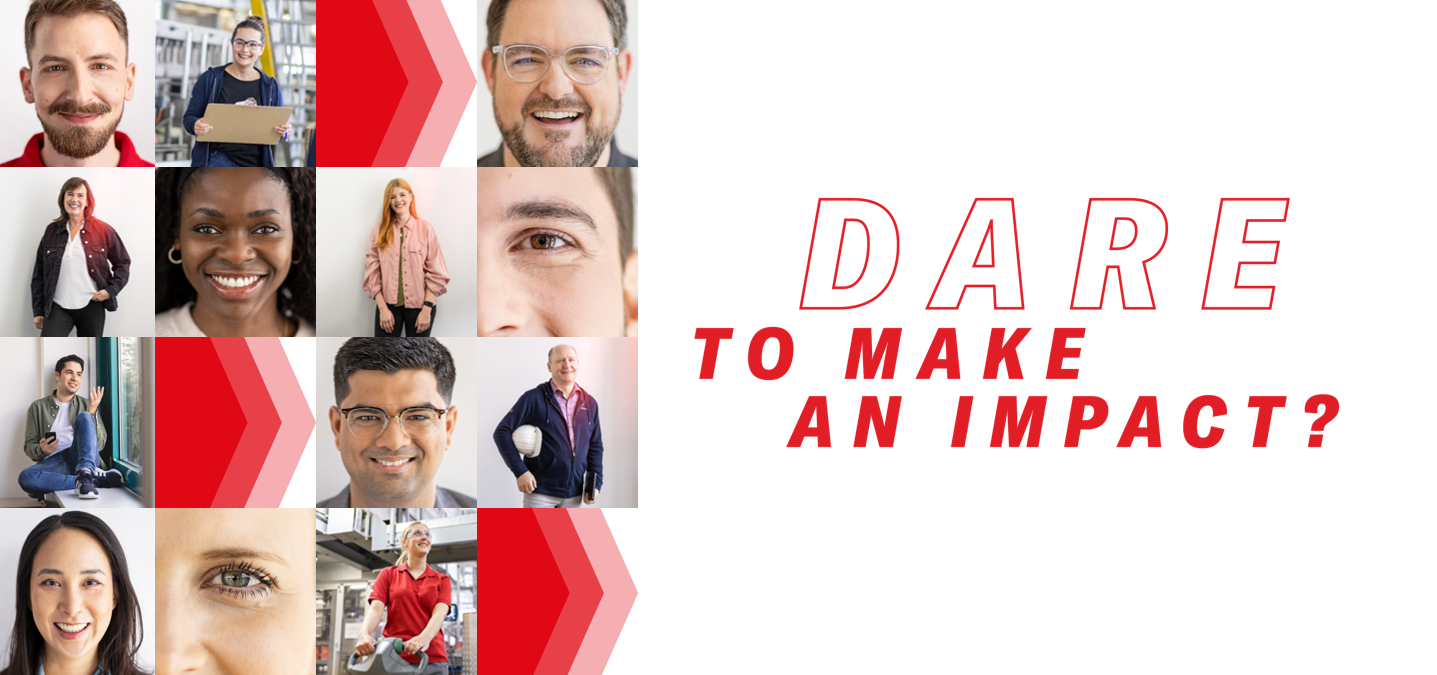Discover the brands and technologies from our business units Henkel Adhesive Technologies and Henkel Consumer Brands.
30 Nov 2022 Dubai
New Technologies have Driven the HR Industry Forward
Interview with Douglas Horne, Head of Human Resources GCC and Jordan and Ahmed Elnahal, Regional Head of Human Resources IMEA at Henkel
“Several processes are now automatically steered and need less administrative manual work. This certainly helps to optimize workflows for multinationals such as Henkel.”
In your opinion, how has the HR industry evolved over the years? What are some of the advantages of the current technological evolution?
Over the last decades, you can see a clear shift from a supporting function focused on administrative tasks, to being an essential adviser to the business. Elevating our HR professionals to the level of business advisors implies acting and engaging in sharing the accountability of business results at all levels of the organization.
To meet today’s demands and those of tomorrow, we have a strong emphasis on attracting, engaging, developing, and retaining employees to meet our specific business goals and aspirations – this approach became an essential factor of the business strategy. We both believe that over the years, the Human Resources department has developed several specialisms with unique responsibilities that leads to a more strategic approach within the function. Sharing accountability for the implementation of the overall business strategy, is one action we personally feel takes us to the next level to help the organization reach its business aspirations.
Another topic which became, and continues to become, more and more relevant is that company culture can significantly impact an organization’s capability to perform effectively. Here, Human Resources became a chief custodian for reinforcing leadership and supporting teams to adopt and develop the company’s culture. Henceforth, we are more focused on establishing this company culture together with areas such as employee engagement, diversity equity & inclusion, and employer branding, which are key to attracting the future workforce.
From a technological perspective, we went through a drastic evolution – new technologies have driven the HR industry forward allowing it to progress in several ways. To give few examples:
Several processes are now automatically steered and need less administrative manual work. This certainly help to optimize workflows for multinationals such as Henkel. In the GCC for example, we are using advanced digital tools for administration & payroll application which are conveniently accessible via any personal devices – this improves accessibility of data for our employees and eases the administrative burdens we used to have.
Overall, we have far more data available than only few years ago which makes it also easier to evaluate more accurately and make more data driven assessments. These metrics allow us to take the best managerial judgments in line with the business strategy & vision. Again, this enabled HR to be less operational but rather more strategic. Digital transformation is undoubtedly one of the most significant changes affecting organizations. It allowed us to broaden and intensify our reach to key stakeholders by utilizing different formats and media.
What are some of the challenges plaguing the HR industry and how can they be effectively mitigated?
One major challenge is definitely the increasing competition for talent:
It is far higher and different now after the pandemic. As an organization, we are competing not only with companies of the same industry but also of a large pool of new digital businesses and recent start-ups. To compete, we need to (re)think of how to attract new talents as well as develop and engage existing employees.
Adequate total rewards packages are a given – on top of that employees demand more flexibility and creative opportunities that challenge them to make more individualized choices to nurture and grow their professional and private lives.
Total Rewards does still play an important role, however not the only one for employees to consider job offers. Focusing on company culture and strong team values provide a significant incentive to remain or join. That is why effective and inspirational leadership is desired more than ever by employees. Leaders have to be open for transformation and accompany the team’s evolution to be able to stem the large attrition in the market.
Since 2012, Henkel had a Work-life Flexibility Charter in place, which frames office vs. mobile work. Based on this, different working arrangements exist providing different levels of flexibility to our colleagues – this has certainly been accelerated through the pandemic. We had to adapt further and hence developed a framework that covers the role of office, mobile work, employee health, sustainability, travel, and workforce digitalization – the so-called Smart Work. We thereby acknowledge the need for flexibility, to have a more symbiotic work-life balance and be trusted to do the job the way which works best for each individual with an emphasis on performance over presence
Nevertheless, it is not without challenges. Remote working can also amplify the risk of employees losing that sense of belonging and not being able to identify with the company culture anymore. Here again, balance is the key to compete. We see the power of working together in person and our offices will always play a crucial role in our Henkel culture – for enabling collaboration, innovation, knowledge exchange and a place of belonging and community that shapes our company spirit.
Ultimately, we want our employees to feel valued and supported in the working model which fits best to them and to their role. Encompassing mental and physical health, wellbeing of our employees is a strong focus area particularly post pandemic. Creating tailor-made wellness programs and initiatives is top of our priority, which we design to meet the individual needs and demands of each employee.
Our company purpose “Pioneers at Heart for the Good of Generations’ expresses what unifies us and creates a sense of belonging in every individual employee. Combined with a clear strategy and company values everyone can identify with, it can mitigate the challenges faced in a VUCA world.
We personally find it also important to define a realistic and compelling Employer Value Proposition (EVP) that reflects the true employee experience as it is changing throughout different times. We have recently revamped our EVP on a global level with the new tagline “Dare to make an impact?” to make it more tangible to our future talents and existing employees. The new EVP reflects our transformation towards a collaborative culture of empowered people, where talents can grow and develop both personally and professionally—reinventing yourselves to be future-ready - this is something vital for any organization.
Previously, companies might have been able to control the process of hiring. Today, it’s more candidate-driven. Job seekers not only have more opportunities in their hands but more access to the perceptions of what it is like to work at the company. All in all, they select their future companies more carefully based on its reputation and employer value proposition (EVP). To facilitate better recruitment and overcome challenges, we must focus on a combination of parameters: robust EVP, powerful company culture and identity as well as competitive total rewards for the employee along with a leadership that is steering, developing, and navigating teams through frequent and unpredictable change in the workplace.
Which are a few technological trends influencing the HR industry today? What are some of the best practices businesses should adopt today to steer ahead of competitors?
There is a range of trends that are redefining HR; big data/data analytics, the digital learning experience, social media platforms and technology upgrades for remote work – to name only few of them.
When it comes to attracting and recruiting new employees, it is very common to use algorithms to help target and narrow down the right candidate on the respective social media platforms that have a specific set of skills, experience level and attributes that are desirable for the position. For our IMEA region, we are actively collaborating with platforms such as LinkedIn to access talent profiles according to our specific needs & expectations for vacancies. In the digital era, we really rely on this kind of tailor-made research data to enable us to shortlist more efficiently & accurately.
Similarly, the selection process is made easier through resume parsing which saves recruiters time by managing automated storage and analysis of CV data. The hiring process in general can speed up with several digital tools, to give another example: networking virtually with candidates or contributing to a virtual employment fair is a great opportunity to e-meet candidates located in different geographies and remain in touch during times of pandemic. At the American University of Sharjah, our teams from the UAE participated in a virtual career fair in the previous year – for us, a fantastic opportunity to interact with new talent the digital world. Long term, we think it helps us to connect faster and accelerates the hiring process.
The later has also allowed us to support our employees remotely during the phase of lockdowns in the past years. It provided us with greater workplace flexibility while still allowing employees to connect with colleagues virtually to continue fulfil their day-to-day responsibilities. Previously, remote work was not as prevalent to the extent we see today because the technologies were not as widely accepted or required. Teleconferencing and telework technology have progressed rapidly allowing employees to comfortably work from home. We think it is essential to provide bespoke and up-to-date infrastructure for both physical and more so the virtual environment to ensure employees can work effectively.
Another category heavily impacted by digital tools is the learning & development environment. Digital learning has rapidly progressed in the last years and has been necessary in response to the Covid-19 pandemic. Embracing this practical way of training and developing employees, we at Henkel have been able to move more towards skill-based and digital skills training rather than pure knowledge transfer. Technology has allowed for a more effective blended learning approach with greater opportunity to integrate participants from a variety of locations. For our IMEA teams, we are continuously providing significant upgrades of digital learning resources on Henkel's online platform to facilitate learning during the (post)pandemic phase. This includes supporting the seamless continuation of learning & upskilling with platforms such as the Henkel Learning Hub which enables employees to acquire knowledge instantly.
Leveraging big data analytics can support in enhancing different areas of HR responsibilities from recruitment, performance assessment to upskilling and rewards. Big Data is key for HR professionals to operate effectively in a modern work environment and enables them to make better decisions. At the end of the day, it enables organizations to be more agile and efficiently meet their goals.
Do you have any advice for industry veterans or budding entrepreneurs from the HR industry space?
Being in the industry combined for more than 30 years, we believe that reviewing the generational trends and creating a workplace where a more generationally dynamic workforce can operate together effectively is crucial.
In addition, we as HR experts need to further emphasis how individuals in the work force understand and evaluate information to best make decisions. The rapid digitalization of our society and vast quantities of information that are available to all confirm that “experts” are no longer those with the most knowledge but actually those who can use this knowledge to create a competitive advantage for their organization. As HR professionals it will be important to develop these creative, critical, and analytic skills across the workforce.
The pandemic has certainly accelerated new work models, however we believe the more social side of work, people to people interactions whether face to face or virtually, should remain a huge focus despite all technological advancements.




